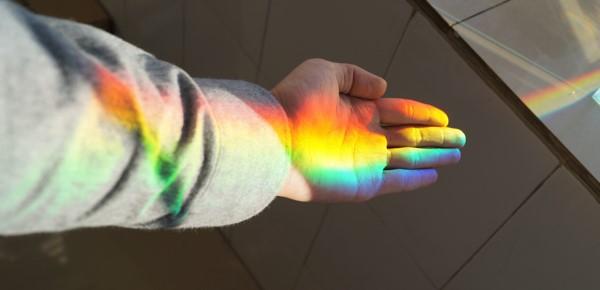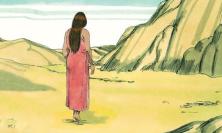‘All of us who live from the gift of faith are witnesses of hope – a real, practical hope, which is not trapped in the old patterns but can realise new possibilities.’ James Hanvey SJ draws our attention to the work of the Spirit to bring us into communion with one another, a communion in which we see Christ in every hopeful or sorrowful face.
In times of darkness, through all pandemics, wars, and upheavals, we can feel absence and confusion more than presence.
Yet we know from our own experience that Christ is always present, calling to us, leading us even from within the darkness, ‘for the darkness is not dark to you’ (Psalm 139:12).
The particular gift of faith, one that is deepened and confirmed throughout the gospel and experienced every day in the Church’s liturgy, is the recognition that even when ‘the divinity hides itself’, God is always labouring and working for us.
In these months our quarantined and self-isolating world has discovered again the symbol of the rainbow. The promise is made secure in Christ that God will never abandon our world to emptiness and darkness. Especially in this Easter time, we see the wounded but Risen Christ come not as judge but as consoler.
Only faith can see this, and this is why faith, far from being an obstacle, is a hope; a consolation that gives us the strength to believe in the possibility of transformation: of new life and new beginnings.
This is why all of us who live from the gift of faith are witnesses of hope – a real, practical hope, which is not trapped in the old patterns but can realise new possibilities.
This is the imperceptible work of the Spirit in us, and in all those whose minds and hearts are searching for better ways of living together, of being in a real communion.
How then do we bring authentic consolation to our suffering world?
I believe that the gospel opens up paths of encounter with our world, especially those who are lost, abandoned, and forgotten. Those, too, who may not acknowledge any faith but long for a better world, a more compassionate and just community, a new way of sharing life with the whole of God’s good creation, still becoming and evolving.
Whenever we hear the words of Christ and attend with an open heart, we see ourselves and those around us in a new light. We see that the beatitudes are not just something for the future, but even now they are among us. The corporate and spiritual works of mercy are already our solidarity and communion in action. They are the paths on which the Spirit is leading us to encounter the face of Christ in each other.
Covid-19 has exposed the fragilities and the illusions, the inequalities and the failures of our systems.
It has also revealed the many faces of generosity; humble and heroic faces of service and self-sacrifice even to the point of death. Lives put at the service of others barely known except in their desperation and need.
The forgotten, the aging, the disabled and marginalised, those who are exposed to violence whether domestic or state, those who have no ‘place to shelter’. Every day they appear in the statistics and in the news. But in Christ anonymous numbers become faces. In them He shows His face. Not the faces of celebrity or fashion that our imagination or our art has created, but the faces of the people we hide from, or prefer not to know because they are not beautiful - except to Him. In their faces He looks at us: the face of sorrow, the face of the resurrected one. (Novo millennio ineunte §24)
Our work is not to paint another beautiful face for people to admire in the galleries of our hygienic imagination. Our work is to look upon the faces of sorrow and hope, and to make them even more visible. So that the faces to which we have become blind shine more urgently and radiantly. They are Christ’s testimony to us and to our world of another way of being: to see each other again through His eyes in compassion and in service; in communion beyond division.
With simple faith we ask that the life of the Holy Spirit will carry us beyond the virus to the communion, the koinonia, in which we celebrate the sharing of our goods for the good of these vulnerable ones who have nothing to give us in return but their blessing.
For all its destruction and evil, the virus humbles us and frees us; it offers us another way of being, another way of seeing beyond the old ‘normal’ to see into the face of Christ, to recognise again the paths that lead to the Kingdom for which we pray and hope. ‘Come, Holy Spirit, and renew the face of our earth.’
James Hanvey SJ is Secretary for the Service of the Faith for the Society of Jesus.
Pray with the reflection in this video produced by the Catholic Bishops' Conference of England and Wales:






